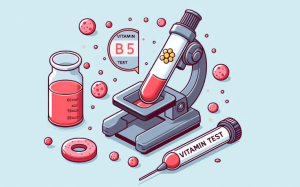What is a Vitamin B9 Test/Folate Test?
A Vitamin B9 test, also referred to as a Folate test, measures the levels of folate (vitamin B9) in your blood. Folate is a water-soluble vitamin crucial for various bodily functions, including DNA synthesis, red blood cell production, and cell division. It is especially important during periods of rapid growth, such as pregnancy and infancy.
Why Do You Need a Vitamin B9 Test/Folate Test?
Your healthcare provider might order this test if they suspect:
- Folate deficiency: Symptoms like fatigue, weakness, pale skin, shortness of breath, sore tongue, or neurological problems might suggest a deficiency.
- Monitoring folate supplementation: People taking folic acid supplements, especially pregnant women or those with certain medical conditions, might need regular monitoring.
- Assessing certain medical conditions: Conditions like malabsorption disorders, celiac disease, or certain medications can affect folate levels.
- Prenatal screening: Folate testing is crucial during pregnancy to prevent neural tube defects in the developing baby.
What Does a Vitamin B9 Test/Folate Test Measure?
The test directly measures the concentration of folate in your blood serum. It can indirectly provide information on:
- Folate status: Whether you have sufficient, deficient, or excessive levels of folate.
- Potential health risks: Folate deficiency can lead to anemia, birth defects, and other health problems.
- Underlying conditions: Abnormal levels might signal issues with nutrient absorption or other medical concerns.
Preparing for the Test
Generally, no specific preparation is required for a Vitamin B9 test. However:
- Fasting: Some labs might require fasting for a certain period before the test. Check with your healthcare provider.
- Medications: Inform your doctor about any medications or supplements you are taking, as some might affect folate levels.
Understanding the Results
Normal folate levels typically range between 3-17 ng/mL. The interpretation might vary depending on the lab and individual factors.
- Low levels (deficiency): This could indicate a risk of anemia, neural tube defects (in pregnant women), and other health complications.
- High levels: Excess folate is generally excreted in urine and rarely causes any problems. However, extremely high levels might mask a vitamin B12 deficiency.
- Normal levels: Indicate adequate folate status.
Risk Factors and Prevention
Factors increasing the risk of folate deficiency include:
- Poor diet: Diets lacking in folate-rich foods like leafy green vegetables, legumes, citrus fruits, and fortified grains can lead to deficiency.
- Malabsorption disorders: Conditions affecting nutrient absorption can impact folate levels.
- Alcohol abuse: Chronic alcohol use can interfere with folate absorption and metabolism.
- Pregnancy: The increased demand for folate during pregnancy raises the risk of deficiency.
- Certain medications: Some medications can affect folate levels.
Prevention and management focus on:
- Balanced diet: Include a variety of folate-rich foods in your diet.
- Supplementation: Your doctor might recommend folic acid supplements, especially for pregnant women or individuals with specific risk factors.
- Addressing underlying conditions: Treating any conditions causing malabsorption or affecting nutrient uptake is important.
- Limiting alcohol intake: Moderation or abstinence from alcohol supports maintaining adequate folate levels.
Remember, maintaining optimal folate levels is essential for overall health and particularly vital during pregnancy. Consult with your healthcare provider if you have any concerns or suspect a deficiency

 7351982473
7351982473











